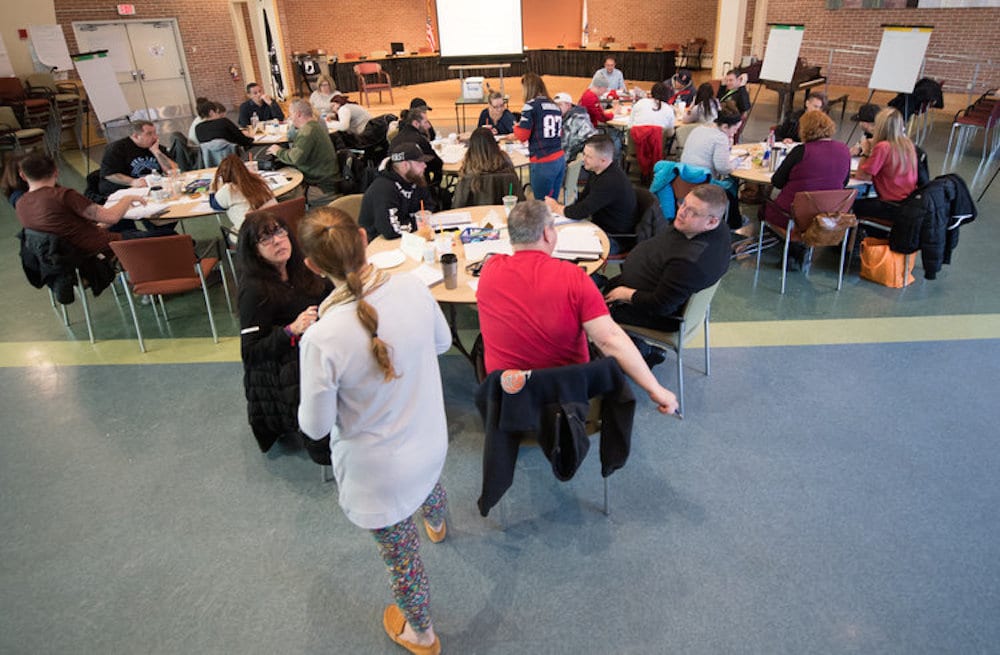MALDEN — In the battle against the regional and nationwide epidemic of substance abuse and opioid addiction, the numbers are growing for Malden Overcoming Addiction’s (MOA) “army” of trained recovery coaches.
MOA was the first advocacy organization in the greater Boston/North Shore region to institute and complete a recovery coach training program just nine months ago with its first class of 23 individuals, who support, assist and advise those experiencing addiction and substance abuse disorders. Many of them were Malden residents and others came from communities around the region.
Similar trainings have been undertaken and successfully completed in surrounding communities such as Lynn and Everett over the past six months.
From the outset, MOA developed and maintained a strong working relationship with Malden’s public safety departments along with many city and state officials. With the help of grant money from from the Malden Police Department and Malden Fire Department, MOA President Paul Hammersley and other volunteers from the group organized the most recent recovery coach training session, adding more than 30 to the ranks.
“It’s a testament to the type of people we have in Malden and around the area who want to get involved and really make a difference in the lives of folks who are afflicted with substance abuse disorder and are battling addiction,” Hammersley said. The MOA co-founder, himself a recovering addict, praised the strong support shown the recovery coach training program has received from the city of Malden and the office of Mayor Gary Christenson.
Hammersley said Malden Overcoming Addiction has the most recovery coaches affiliated with its organization than any other in Massachusetts and most likely in New England.
In just under nine months, MOA now has overseen three recovery coach training sessions. With the latest addition of 32 more coaches, that brings the total to 83 trained recovery coaches overall.
MOA received assistance in coordinating the most recent training session from Malden Human Services and Community Outreach Director Karen Colon Hayes.
“The city of Malden and lots of department heads and staff members have been behind us from the start. From the mayor on down we have received full support for our recovery coach training and all of our programs,” Hammersley said.
Christenson and Malden Police Chief Kevin Molis were both on hand for the latest graduation ceremony. “They are both really behind us, it is very encouraging to all of us that are involved,” Hammersley said.
The recovery coach training includes some 30 hours of intensive instruction and certification methods administered by the Connecticut Community for Addiction Recovery (CCAR) staff in a Malden site. The grant assistance MOA received paid for the training for the newest coaches.
“The main task of recovery coaches is to help those recovering from addiction to avoid relapse,” Hammersley said. “Those who come out of treatment and rehab are usually at their most vulnerable.
“Most people new to recovery are overwhelmed as they try to navigate picking up the pieces and putting their lives back together.”
Recovery coaches are working with the Malden Drug Court Program to help those with substance abuse challenges, he said. Also, there are lobbying efforts under way for funding from the state Department of Public Health (DPH) to establish a recovery center in Malden.
The concept of what would be known as the Bridge Recovery Center in Malden has the backing of local and state officials, including state Sen. Jason Lewis, (D-5th Middlesex, Malden, Melrose), who heads up the Joint Committee on Public Health at the State House. When established, it would serve Malden and residents in other communities in the greater Boston/North Shore area such as Medford, Everett, Lynn and Revere.
Services would include assistance for those seeking counseling, employment and navigation through the state local legislative workings for benefits. Legal advice is planned for another offering.
“It is a critical need for Malden residents and beyond who are fighting substance abuse disorder and opioid addiction,” Hammersley said of the recovery center proposal. “We are very optimistic and hopeful this can happen.”

